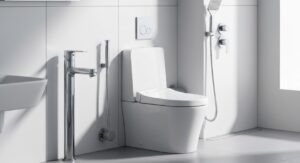Is your water heater on its last legs, or are you just looking for a more efficient upgrade? You’re in luck! Today’s models are more energy-efficient than ever before. Choosing a new water heater is a big decision you’ll live with for a decade or more. While many homes still use traditional tank water heaters, exploring options like modern electric water heaters can lead to significant savings on your utility bills. This guide will help you in choosing the right water heater that will perfectly fit for your home.
Understanding Water Heaters: What Every Homeowner Should Know
A water heater is one of the hardest-working appliances in your home. From that first warm shower in the morning to running the dishwasher after dinner, it provides the hot water necessary for daily cleaning and comfort. Because it’s used so frequently, heating water can account for roughly 18% of your home’s total energy consumption.
This significant energy usage is why choosing the right unit is so important. An inefficient or improperly sized water heater can lead to high utility bills and the frustration of running out of hot water. Whether you have traditional tank water heaters or are considering modern electric water heaters, the goal is the same: reliable hot water when you need it.
Determining the appropriate size and capacity is the first step toward achieving this goal. You need a water heater that can meet your family’s peak demand without constantly running and wasting energy. We’ll cover how to calculate this later on, ensuring your new unit is a perfect match.
Key Features to Consider Before Making a Choice
When comparing water heaters, look beyond price to key features that reveal performance and durability. Details like a longer warranty often indicate better construction and components. To avoid disappointment, focus on these features:
- Warranty: Longer warranties (10–15 years) suggest superior insulation, thicker tank walls, and robust heating elements.
- Drain Valves: Brass valves are more durable than plastic ones.
- Digital Displays: Offer precise temperature control and easier troubleshooting.
Prioritizing these features ensures you choose a reliable, long-lasting water heater.
5 Types of Water Heaters Explained
Water heaters now come in various types beyond the traditional basement tank. Each offers unique advantages, and your choice depends on fuel source, space, and budget. Knowing the pros and cons of each type helps you choose wisely. Here’s a quick overview of the most common water heater options, from classic tanks to advanced hybrids.
1. Traditional Storage Tank Water Heaters
Storage tank water heaters are the most common type in American homes. They use an insulated tank, typically holding 30 to 80 gallons, to keep hot water ready at all times. Powered by gas or electricity, they differ from tankless models, which heat water only when needed. Gas heaters usually cost less to operate than electric ones but may have a higher upfront price. These heaters are popular due to their lower purchase and installation costs. However, they are less energy-efficient because they constantly use energy to maintain hot water, resulting in standby heat loss.
2. Tankless (On-Demand) Water Heaters
Tankless gas water heaters, or on-demand heaters, heat water instantly with gas burners or electric coils instead of storing it. This eliminates standby heat loss, making them much more energy-efficient and lowering utility bills. Key benefits include endless hot water, greater energy savings (especially with gas models), longer lifespan (20+ years), and a compact design that saves space.
3. Heat Pump (Hybrid) Water Heaters
Heat pump water heaters, or hybrid models, are highly efficient electric options. Instead of using heating elements, they pull heat from the surrounding air and transfer it to the water. According to the Department of Energy, they are two to four times more energy-efficient than standard electric water heaters, leading to significant long-term savings—ideal for homeowners looking to cut energy use.
However, these units require more space and clearance for airflow, as they are often taller than standard tanks. They also produce condensation that must be drained, which can complicate installation.
4. Solar Water Heaters
For eco-conscious homeowners, solar water heaters are an environmentally friendly option that uses the sun’s energy. Roof-mounted collectors absorb heat to warm water in a tank. There are two main types: direct circulation systems for warm climates, and closed-loop systems with antifreeze for colder areas. The main benefit is lower energy bills, especially in sunny regions. However, installation is costly—typically $1,000 to over $5,000—and a backup heater is usually needed for cloudy days.
Pros:
- Uses renewable solar energy
- Cuts energy costs
Cons:
- High upfront cost
- Requires a backup system
5. Condensing Water Heaters
If your home uses natural gas and needs a large amount of hot water, a condensing water heater is an efficient choice—ideal for tanks over 55 gallons. These heaters use a second heat exchanger to capture heat from exhaust gases, preheating incoming cold water so the burner works less. This makes them much more efficient than standard models. While they cost more upfront, they use less fuel and provide more hot water, resulting in long-term savings on your gas bill. Many Energy Star models may also qualify for tax credits to help offset initial costs.
Getting Started: Essential Items and Resources for Choosing a Water Heater
Now that you know the types of water heaters, gather information specific to your home before shopping. A little preparation helps you choose the right heater and avoid frustration. Consider your daily hot water usage, available space, and local fuel options. Here are the essentials to get started.
Determining Your Household’s Hot Water Needs
The first step in choosing a water heater is to determine your household’s hot water usage, which is crucial for selecting the right size and capacity. An undersized unit leads to cold showers; an oversized one wastes energy. Consider your family’s routines, such as multiple morning showers or running appliances simultaneously, to assess peak demand. Account for all daily hot water activities: showering, bathing, using the dishwasher, washing laundry, and cleaning.
Calculating Water Heater Size and Capacity
Once you know your usage, choose a water heater size. For tank models, focus on the First-Hour Rating (FHR)—the gallons of hot water available in an hour. Match the FHR to your family’s peak demand. For tankless units, check the Gallons-Per-Minute (GPM) rating; add up the GPMs for all fixtures used at once.
General guidelines:
- 1–2 people: 30-gallon gas/electric
- 2–4 people: 40-gallon gas / 50-gallon electric
- 5+ people: 50-gallon gas / 80-gallon electric
Gathering Information on Local Fuel Types and Availability
Your home’s fuel source is key when choosing a water heater. Most homes are set up for either gas or electric models, and sticking with your current type is usually easiest and most cost-effective. Switching—such as from gas to a high-efficiency electric heat pump—may require expensive electrical upgrades. Factor installation costs into your budget. Before deciding, check which fuel types are available: natural gas, propane, electricity, or solar (if suitable for your location).
Step-by-Step Guide: How to Choose the Right Water Heater for Your Home
Overwhelmed by options? Relax—we’ve simplified the selection into five steps. This guide helps you assess your needs, compare water heater types, and plan for maintenance. By the end, you’ll confidently choose the best water heater for your home.
Step 1: Review Your Home’s Hot Water Usage
Begin your search for a new water heater by assessing your household’s peak hot water demand—the busiest hour of usage. This is crucial for choosing the right size unit. Consider how many showers occur back-to-back and if appliances like dishwashers run simultaneously. List all hot water appliances and estimate when they’re used at the same time, including showers, bathtubs, dishwashers, washing machines, and sinks. This helps avoid buying a unit that’s too small or too large.
Step 2: Compare Different Water Heater Types
With a clear understanding of your needs, you can compare water heater types. The main difference: tank models store hot water, while tankless units heat it on demand—impacting efficiency, cost, and performance. Your lifestyle and home layout will guide your choice. For large families often running out of hot water, a high-GPM tankless unit may be ideal. For tight spaces, consider a compact tankless or “lowboy” model.
Key comparisons:
- Upfront Cost: Tank heaters are most affordable; solar and tankless cost more.
- Operating Cost: Heat pump and tankless models save most long-term.
- Space: Tankless and lowboy models fit small areas; heat pumps need more space.
- Hot Water Supply: Tankless offers endless hot water; tanks have limited capacity.
Step 3: Assess Energy Efficiency Ratings
Energy efficiency greatly impacts your choice of water heater and long-term costs. More efficient models have lower annual operating expenses, saving you money over their 10-20 year lifespan—even if the initial price is higher. Compare options using the Uniform Energy Factor (UEF); higher UEF means better efficiency. Look for the blue ENERGY STAR® label for certified energy-saving products. Heat pump and tankless water heaters offer top efficiency and typically pay for themselves within a few years through reduced operating costs.
Step 4: Consider Installation Costs and Requirements
The cost of a new water heater includes more than just the unit’s price; installation can vary widely based on the type. A direct replacement of a standard tank heater is usually cheapest, while switching types—like upgrading to a gas tankless or heat pump model—can require extra work, such as new gas lines or drains, increasing costs. Always include installation in your budget and get a quote from a professional plumber to understand what your setup needs.
Step 5: Plan for Maintenance and Longevity
Choosing the right water heater means planning for its upkeep. Regular maintenance extends its life and keeps it efficient. Many people install a heater and neglect it, leading to early failures and expensive repairs. Maintenance needs vary by type: storage tanks should be flushed yearly to remove sediment, while tankless models need periodic descaling to prevent mineral buildup.
For a long-lasting water heater:
- Read the manual for specific maintenance instructions.
- Check the anode rod in tank heaters every few years to prevent corrosion.
- Test the T&P (temperature and pressure relief) valve annually for safety.
- Consider models with longer warranties—they’re often built to last.
Factors That Influence Your Water Heater Decision
Choosing a water heater requires balancing your budget, home infrastructure, and hot water needs. There’s no single best option—just the one that fits you. Consider fuel source, available space, and long-term energy savings to make the right choice. Here are the key factors to guide your decision.
1. Fuel Source: Gas, Electric, Solar, or Hybrid
Your home’s fuel source is a key factor when choosing a water heater. Options include natural gas, electricity, propane, or solar. Natural gas usually has lower operating costs but higher upfront costs than electric models. Sticking with your current fuel type is often simplest and cheapest, avoiding costly installation changes like new gas lines or upgraded wiring. Main fuel options:
- Gas (natural gas/propane): Lower operating costs
- Electric: Powers standard and heat pump water heaters
- Solar: Lowest operating cost but highest installation cost
2. Space and Location Considerations
Consider where your new water heater will go. Available space can quickly limit your choices, as newer models are often larger due to added insulation. Don’t assume a new unit will fit where the old one did—measure height, width, and depth before buying. If you have limited headroom, look for “lowboy” or “short” models, which are shorter and wider but hold the same amount of water as standard tanks. Make sure to match capacity to your household needs; if space restricts you to a smaller tank, consider a high-recovery model or a compact tankless unit.
3. Budgeting for Purchase and Installation
Your budget should cover more than just the water heater’s price. Include delivery, professional installation, and possible plumbing, venting, or electrical modifications. Installation can cost as much as the unit itself. Choosing the cheapest model may lead to higher utility bills due to low efficiency. Investing in a high-efficiency model can save money over time. Before buying, check for rebates and tax credits—many utilities and government programs offer incentives for ENERGY STAR® certified models, helping lower upfront costs.
4. Understanding Energy Efficiency and Long-Term Savings
Energy efficiency is crucial when choosing a water heater. High-efficiency models may cost more upfront, but they save money over time since water heating is a major household expense. Even small efficiency gains can lead to noticeable monthly savings. Use the yellow EnergyGuide label to compare annual operating costs—saving $100 per year adds up to $1,000 over 10 years, often offsetting higher purchase prices for tankless or hybrid models.
For maximum savings, look for:
- High UEF rating
- ENERGY STAR® certification
- Lower estimated annual cost on the EnergyGuide label
Common Pitfalls and Mistakes to Avoid
Choosing a new water heater can be challenging, and common mistakes can lead to years of frustration and high bills. Avoid waiting until your current unit fails, as this often forces a rushed decision with limited options. Another mistake is picking the wrong size—either blindly replacing with the same size or oversizing “just in case,” resulting in wasted energy. Always assess your hot water needs before buying.
To ensure you get the right type of water heater for your home, be sure to avoid these common mistakes:
- Focusing only on the purchase price and ignoring long-term operating and installation costs.
- Underestimating the complexity of installation, especially when switching between water heater types.
- Ignoring maintenance requirements, which can shorten the lifespan of your unit.
- Not measuring your space correctly, only to find the new unit doesn’t fit.
Fast, Reliable, and Always Ready—That’s Target Plumbers
Feeling confident about choosing your next water heater? We hope so! But we also understand that it’s a lot to take in. With so many different water heater types, efficiency ratings, and installation requirements to consider, making the final call can still feel a little daunting. That’s where we come in.
At Target Plumbers, our friendly experts live and breathe this stuff. We can help you assess your needs, compare your options, and find the right water heater that fits your home and budget perfectly. From selection to professional installation, we’ll make sure the entire process is smooth, simple, and stress-free. Let us handle the hard work so you can enjoy reliable, efficient hot water for years to come.
Conclusion
Choosing the right water heater for your home is essential for ensuring comfort and efficiency. With different types of water heaters, features, and considerations—such as fuel source, energy efficiency, and installation costs—it can feel overwhelming. However, by understanding your household’s hot water needs and evaluating the available options, you can make an informed decision that suits your lifestyle and budget. Remember, investing in a quality water heater not only enhances your daily living but also contributes to long-term savings on energy bills.
Selecting the right water heater is one piece of the puzzle. For a full breakdown of fixture upgrades, check out our blog on Upgrading Your Plumbing Fixtures and explore all the options.
Frequently Asked Questions
How do I determine the appropriate size and capacity of a water heater for my household?
To find the right water heater size, consider your family size and peak hot water usage. For tank water heaters, check the First-Hour Rating (FHR) to ensure it meets your busiest hour’s demand. For tankless models, calculate the Gallons-Per-Minute (GPM) you need for simultaneous use.
What are the main differences between tankless and traditional tank water heaters?
Traditional tank water heaters store and continuously heat a reserve of water. In contrast, tankless water heaters heat water on demand as it flows through the unit. This makes tankless models more energy-efficient and provides an endless supply of hot water, though their upfront cost is higher.
How does energy efficiency impact my choice of water heater?
Energy efficiency directly impacts your long-term costs. A more efficient water heater, like a tankless or hybrid model, will have lower monthly utility bills. While the initial purchase price might be higher, the energy savings over the unit’s lifespan can make it a more economical choice overall.
What are common mistakes to avoid when buying a water heater?
Common mistakes include waiting for your old unit to fail, choosing the wrong size for your needs, focusing only on the purchase price while ignoring installation and operating costs, and not considering the maintenance required for the type of water heater you select. Planning ahead helps you find the right water heater.






